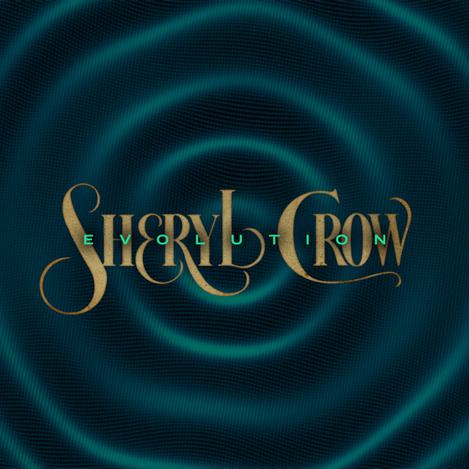Sheryl Crow radiates positivity on Evolution
"Evolution"

The best careers are marathons, not sprints and Sheryl Crow’s latest, Evolution, adds a new and confident leg to hers.
She started her race as an elementary school music teacher, jingle singer, and backing vocalist to Michael Jackson, Belinda Carlisle, and the late Kevin Gilbert prior to pursuing her own artistic vision. It was Crow’s connection to Gilbert that led her to the esteemed musician Bill Bottrell; he would lay collaborative hands on Crow’s debut set for the A&M imprint: Tuesday Night Music Club (1993).
Ten albums rose in the wake of that effort for Crow and her current offering, each contributing to the legend of this vocalist, lyricist, musician and producer. These recordings were a study in creative cooperation between (supposedly) opposing aesthetic profiles: modern rock goddess and intuitive pop maven. The preceding release Threads (2019), her first project on the Big Machine label – via their Valory Music arm – was touted as her last release. Until it wasn’t.
After 2022's acclaimed retrospective documentary Sheryl – and just before her induction into the Rock & Roll Hall of Fame in late 2023 – Crow announced that Evolution (her second for Big Machine) was forthcoming. “This music and these lyrics came from sitting in the quiet and writing from a deep soul place,” she detailed in her own words, “I said I’d never make another record, I thought there was no point to it. But this music comes from my soul. And I hope whoever hears this record can feel that.”
Although Crow is unsurprisingly positioned as the principal songwriter on Evolution, she still roped in more than a few old friends –and some new ones – to collaborate with: Mike Elizondo, John Shanks, Jeff Trott, the aforementioned Bill Bottrell, Emily Weisband, and Isley Juber. Barring “Do It Again,” dually tunesmithed by Crow and Shanks, Elizondo executes the rest of the LP’s production; the rest of the assembled crew provide co-writing input, background vocals and select session musician support.
Even with its digital iteration featuring the bonus duet with Genesis founder Peter Gabriel on “Digging in the Dirt,” Evolution is a lean body of work; the physical pressing contains no more than nine tracks. This provides the long player an immediacy and a lightness parted from Threads. As a result, tonally, the collection is her brightest since C’mon, C’mon (2002). Narratively, pieces like “Broken Record” and the cited “Do It Again” find Crow extolling cheeky optimism in the face of our dour times—it is refreshing.
Romantic storytelling can be found on Evolution – the plaintive “Don’t Walk Away” is a fine example – but Crow’s pen game really shines when she explores the metaphysical, a thematic touchstone often visited alongside her socio-political one on some of her past songs. Both the title track and “Where?” have Crow in an existential place with a further awareness of spiritual complexities when she posits this declaration in “Evolution”: “We can create / we can destroy / we can feel pain / we can feel joy / we can plant seeds / and watch love grow / we can feel love / ‘cause it’s written in the human code.”
The words of “Evolution” and “Where?” are painted onto expansive adult contemporary and folk-pop canvases, tastefully trimmed with Eastern and orchestral accents, respectively. Crow’s constant to and fro between rootsy grit and affable polish has certainly been a hallmark of her output. The downside to having a discography with such a broad scope is that one could view her approach as too familiar after a point. Still, Elizondo doesn’t attempt to rewrite her formula, but rather refines it on Evolution.
Whether Crow is tucking into the midtempo rock bohemia of “You Can’t Change the Weather,” or getting lost in the groovy R&B psychedelia of “Love Life,” she demonstrates that she is a musical everywoman, able to move from knowing convention to wider experimentation. That latter point really rears its head on album opener and lead single “Alarm Clock,” a potent blast of old school new wave, an as yet untapped genre in her expansive repertoire. Traces of Crow’s well-rounded sound actioned on Evolution will recall 100 Miles from Memphis (2010), Wildflower (2005) and Sheryl Crow (1996), but without coming across like a shameless rehash.
And then there’s Crow, the singer. Her warm, soulful, expressive qualities haven’t been dulled by time. Looking for evidence? Any cut here will do, but the conclusory “Waiting in the Wings” is where she yields a performance so genuine that it can’t really be called anything other than “classic Crow” à la “Home” or “Good Is Good.” It’s hard to see Evolution as anything less than a gift – something positive put out into the world. Sheryl Crow is just what the doctor ordered.
Get the Best Fit take on the week in music direct to your inbox every Friday

Tunde Adebimpe
Thee Black Boltz

Julien Baker & TORRES
Send A Prayer My Way

Bon Iver
SABLE, fABLE





